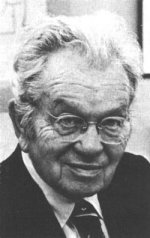Urey, Harold Clayton (1893–1981)
Harold Urey was an American physical chemist who was awarded the 1935 Nobel Prize in Chemistry for his discovery of deuterium, one of the heavy isotopes of hydrogen (1932)., which he also named. He contributed to the growing basis for the theory of what was widely accepted as the origin of the Earth and, in 1953, along with Stanley Miller, carried out research into the possible make-up of Earth's primeval atmosphere and prebiotic evolution (see Miller-Urey experiment).
During the birth of the Space Age in the 1950s, Urey was a major proponent of solar system exploration and the search for extraterrestrial life, becoming involved with the Apollo and Viking missions. He also investigated organic matter in meteorites.
 |
Reference
1. Urey, H. C. The Planets: Their Origin and Development. New Haven, Conn.: Yale University Press (1952).


